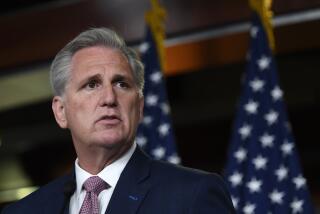Brady’s Debt Proposal
- Share via
Treasury Secretary Nicholas Brady’s proposals for resolving the Third World debt are, at best, a disappointment.
There is an absence of details, perhaps accounted for by a statement from White House Press Secretary Marlin Fitzwater explaining that “final presidential decisions have not been made so they would not be represented in the speech.”
There is a certain unreality to the whole affair, marked by Brady’s assertion that “we have accomplished much” when, in fact, the absence of progress has been appalling.
Perhaps the most positive thing that can be said is that the secretary of the treasury is at least talking about the $1.2-trillion debt that is sucking the economic blood out of the nations of Africa and Latin America. But his proposals seem to fall far short of the kind of response that is warranted by a situation that is crippling the lives of millions of people and undermining the fragile structures of democracy in many nations.
As best we can understand Brady’s ideas, he would modify but not abandon the so-called Baker Plan, set forth by his predecessor, James A. Baker III (now Bush’s secretary of state). In addition, Brady tells us that he has won the support of Japan, now the world’s No. 1 provider of development assistance, to play a major money role. And he has contrived a controversial scheme to shift much of the debt-relief effort to the World Bank and International Monetary Fund.
Brady is maintaining the Baker Plan commitment to structural reform of the economies of the debtor nations, and so he should. A new study of African economies has demonstrated the superior performance of nations that have accepted those stringent changes first preached by the IMF and now reinforced in World Bank lending. That was part of the Baker plan and should be part of the Brady plan. But he now seems determined to weaken it by diverting IMF and World Bank funds to debt-service programs, including guaranteeing conversions of debt to equity. It would be one thing for the rich of the world to create a special fund for that purpose. But this is not the time to divert the World Bank from its crucial development lending.
American taxpayers, already overwhelmed with the cost of bailing out the savings and loan depositors, certainly are not going to accept a burden to protect U.S. banks from loan losses in Latin America. There is no reason that American banks cannot contrive their own rescue mission in Latin America. The banks would be foolish indeed not to remain engaged in the economic expansion that will inevitably resume in the hemisphere. The African debt, in a sense, is easier handled, because most of it is owed governments that can well afford to postpone payments and suspend interest.
There already are signs of recovery among the debtor developing states that have reformed their economies, Brady noted. But he will need to provide much more than generalities to achieve his objective “to rekindle the hope of the people and the leaders of the debtor nations that their sacrifices will lead to greater prosperity”.
More to Read
Get the L.A. Times Politics newsletter
Deeply reported insights into legislation, politics and policy from Sacramento, Washington and beyond. In your inbox twice per week.
You may occasionally receive promotional content from the Los Angeles Times.










